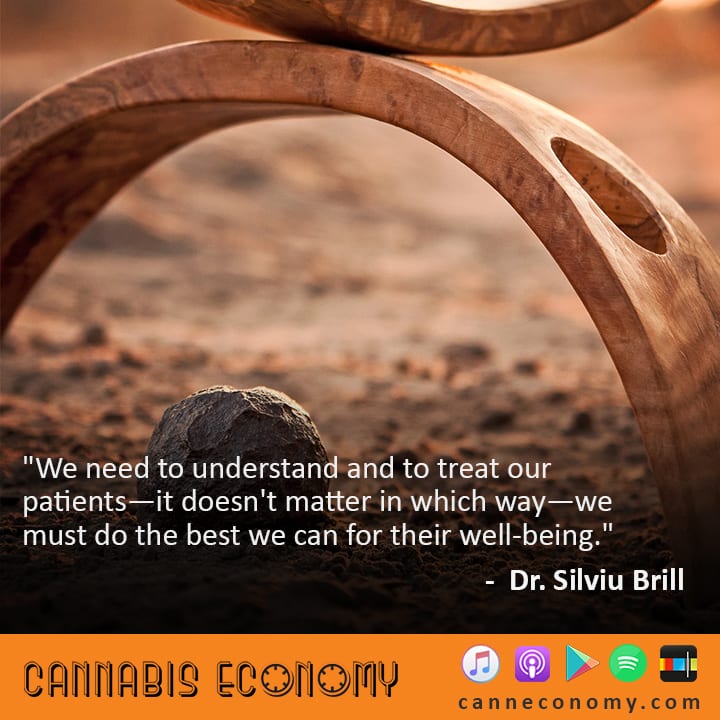
EP. 431: Dr. Silviu Brill, Tel Aviv Medical Center
May 13, 2019Dr. Silviu Brill, of the Pain Institute of Tel Aviv Medical Center, is passionate about the need for personalized medicine in Israel and around the world. Although he believes that some standardization is necessary, it is indisputable that each person and condition requires a unique ratio of THC and CBD. As Honorary Secretary of the European Pain Federation, Brill also spends much of his time researching how to best treat chronic pain in Europe. Nowadays, there is an unprecedented open-mindedness about ensuring safe patient access and sensible regulations.
Transcript:
Seth Adler: Dr. Silviu Brill joins us. Welcome to Cannabis Economy, I'm your host, Seth Adler. Download episodes on canneconomy.com, that's two n's and the word "economy", or wherever you currently get your podcasts. Canneconomy.com has a ton of direct insight these days from scientists, policy makers, and business leaders in the space. First a word from MedMen and then Dr. Silviu Brill
MedMen: MedMen continues to expand its footprint on the cannabis landscape, opening new stores in Los Angeles, Las Vegas, and the iconic 5th Avenue in Manhattan. They've also opened a 45,000 ft high-tech cannabis cultivation and manufacturing facility in Nevada. The company has reached a one-million-dollar valuation, making it the country's first cannabis unicorn, and it's just the beginning.
MedMen: Learn how MedMen is building the future of cannabis today at MedMen.com.
Silviu Brill: Hi, my name is Silviu Brill, I'm director of the pain institute of Tel-Aviv Medical Center in Tel-Aviv. Past president of Israeli Pain Association, and for the last few months, Honorary Secretary of European Pain Federation.
Seth Adler: And so.
Silviu Brill: And so.
Seth Adler: You are one of these people, one of these physicians that has helped kind of bring cannabis forward. Especially here in Israel.
Silviu Brill: Yeah, I start use cannabis for medical reasons long time ago, twelve, thirteen years ago. In the medical clinic in Tel [inaudible 00:01:36] where I used to work at the time. I was one of the pioneers who asked for minister of health to give approval for the very very few patients at that time to be treated of medical cannabis.
Seth Adler: You said you were looking for options, before we turned on these microphones. You were looking for options, give us a sense of what you were dealing with with the patients that you had that made you say "Okay, actually, minister, I need another option."
Silviu Brill: I'm dealing with chronic pain, a very difficult condition to treat and to understand. We used, at the beginning and also these days, not cannabis, not as a fertile second line of treatments. When you failed to help your patients, helping reducing pain, improving quality of life, improving sleep, you try to have more things in your arsenal. At that time, cannabis show up as a new option. Very strange, we didn't know how to deal with them, as also in these days.
Silviu Brill: We start to have a new and nice option to treat our patient who've been in large doses of opioids or after medical procedure or surgery. And it worked.
Seth Adler: It worked. Now, you're a physician, how did you know it worked?
Silviu Brill: I... in pain... treating pain, you have only subjective things to ask. Does it help you? Is it reducing your pain? Is it improving? Nothing that I can measure, like blood pressure or temperature. So everything we are doing in my profession is asking and speaking and understanding your patients. That's the way I can say "work", "not work". And again, the side-effects of any kind of treatment.
Seth Adler: So this is... as far as it working, you take their... what they say, however, there is a certain kind of patient that will be okay with taking cannabis, whereas there will be a certain kind of a patient that won't be okay with taking cannabis. Is that what you've found?
Silviu Brill: Definitely. Patients who haven't tried anything is not the first kind of treatment. Patient with contraindication, different psychiatric condition or very young “I'm not happy to start treating with cannabis” without being treated together, multi-disciplinarian with other professions.
Read the full transcript:
Become a member to access to webinars, quarterly reports, contributor columns, shows, excerpts, and complete podcast transcripts
